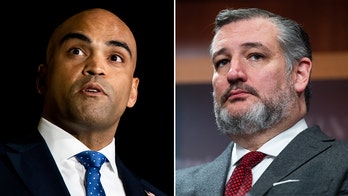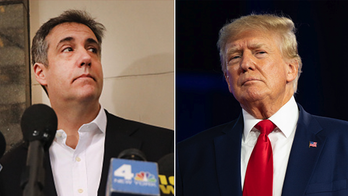Power Play 6/7/2013
Surprise guests join Chris Stirewalt for a special two year anniversary edition of Power Play
“They quite literally can watch your ideas form as you type.”
-- An unnamed career intelligence officer whose “firsthand experience with these systems, and horror at their capabilities” led him to reveal the existence of a government online monitoring program known as PRISM to the Washington Post
Do you trust your government?
Polls suggest the answer for most Americans is not no, but hell no.
Pollsters agree that fewer than one in five Americans now believe that their government will do the right thing most of the time.
Yes, a recent spate of scandals about the abuse of federal power have hurt that assessment. When tax collectors and prosecutors get caught secretly crossing the line to abuse the rights of regular citizens it’s bound to be damaging.
But this is also part of the historical trend that suggests Americans mostly see their government as some combination of incompetent or malevolent, depending on their political persuasion. Whether they mostly blame stinginess, waste, gridlock, totalitarian tendencies, government unions, corporate control, laziness or overreach, Americans generally believe their government is very badly broken.
After 80 years of expansion and diversification, the federal government has profoundly lost the trust of the governed. That’s the worst if you’re a liberal, since any idea you have for government expansion will likely be met by a mixture of outrage and hopeless shrugs. A government that can’t keep the mail running and is routinely caught abusing the public trust isn’t a good candidate for expanded resources and authority.
This is not a good time, then, for the confirmation of what many already believed: That we are being watched, almost always.
National security hawks are looking to brush away the public alarm over the cascade of revelations about domestic surveillance – first the report that the government is tracking who you call, when and for how long and then the even creepier leak that government computers are tracking your Internet activity.
But the answer there is hardly reassuring: We’ve been doing it for years! It’s cool!
Our system has always granted the federal government extraordinary powers in order to protect the lives, liberties and pursuits of happiness of the American people. But when, as now, the enemy lives among us, things get very dicey. The quest for saboteurs, spies and seditionists in the three great wars of the last century resulted in some serious abuses.
But what about a war that never ends with an enemy is not based in any nation but within a portable ideology? Militant Islamism seems to grow pretty well in Watertown, Mass. and Arlington, Va. And it is not as if defeating some foreign power will end the enemy’s activities here.
[pullquote]
Fighting such a war seems to require an unprecedented expansion of permanent federal power over American citizens – to snoop, to detain, to entrap and even to kill.
But with a government so badly broken and the confidence in it ebbing lower and lower, those powers begin to look more and more frightening. What happens when those powers are abused? What if the target shifts from Islamist militants to domestic radicals of other types? What if the threshold for radicalism gets lower as the government grows more distrustful of an anxious citizenry?
What if the targets of tomorrow are those who hate the government?
One whistleblower from the intelligence community deemed the powers as currently constituted as “turnkey totalitarianism” – everything a government would need to fully oppress its people, turning them from citizens to subjects.
A government that can find an individual’s online radical musings and then send agents to entice him or her to join a terrorist conspiracy is in possession of a power more awesome than any totalitarian ruler of the past could have dreamed. To have computers that constantly monitor the nascent thoughts, conversations and activities of everyone in a country is perhaps the greatest power ever afforded to any rulers in history.
That’s why Lois Lerner and the gang at the IRS matter. That’s why Eric Holder’s targeting of journalists matters. That’s why Kathleen Sebelius’ squeezing the companies she regulates matters.
A government that cannot be trusted to do small things well can hardy be trusted to do large things well, especially to when those large things are conducted in almost total secrecy.
Those who wish to preserve these powers ought to be more urgently committed to reforming the government than anyone. President Obama’s lukewarm response to the scandals racking up in his administration may be politically necessary, but if he hopes to preserve these awesome powers for himself and future presidents he’d better do more than just order internal investigations and hold rallies for doomed stimulus measures.
He’d better get serious about restoring the public trust, or the very power to protect the public may be swept away in a tide of rising electoral anxiety.
Chris Stirewalt is digital politics editor for Fox News, and his POWER PLAY column appears Monday-Friday on FoxNews.com. Catch Chris Live online daily at 11:30amET at http:live.foxnews.com.





